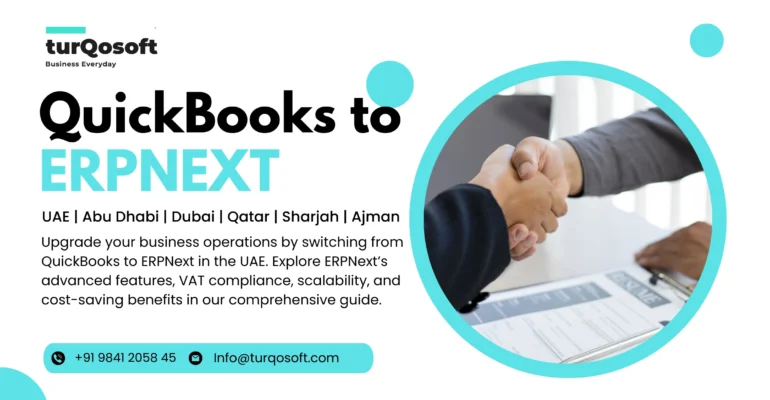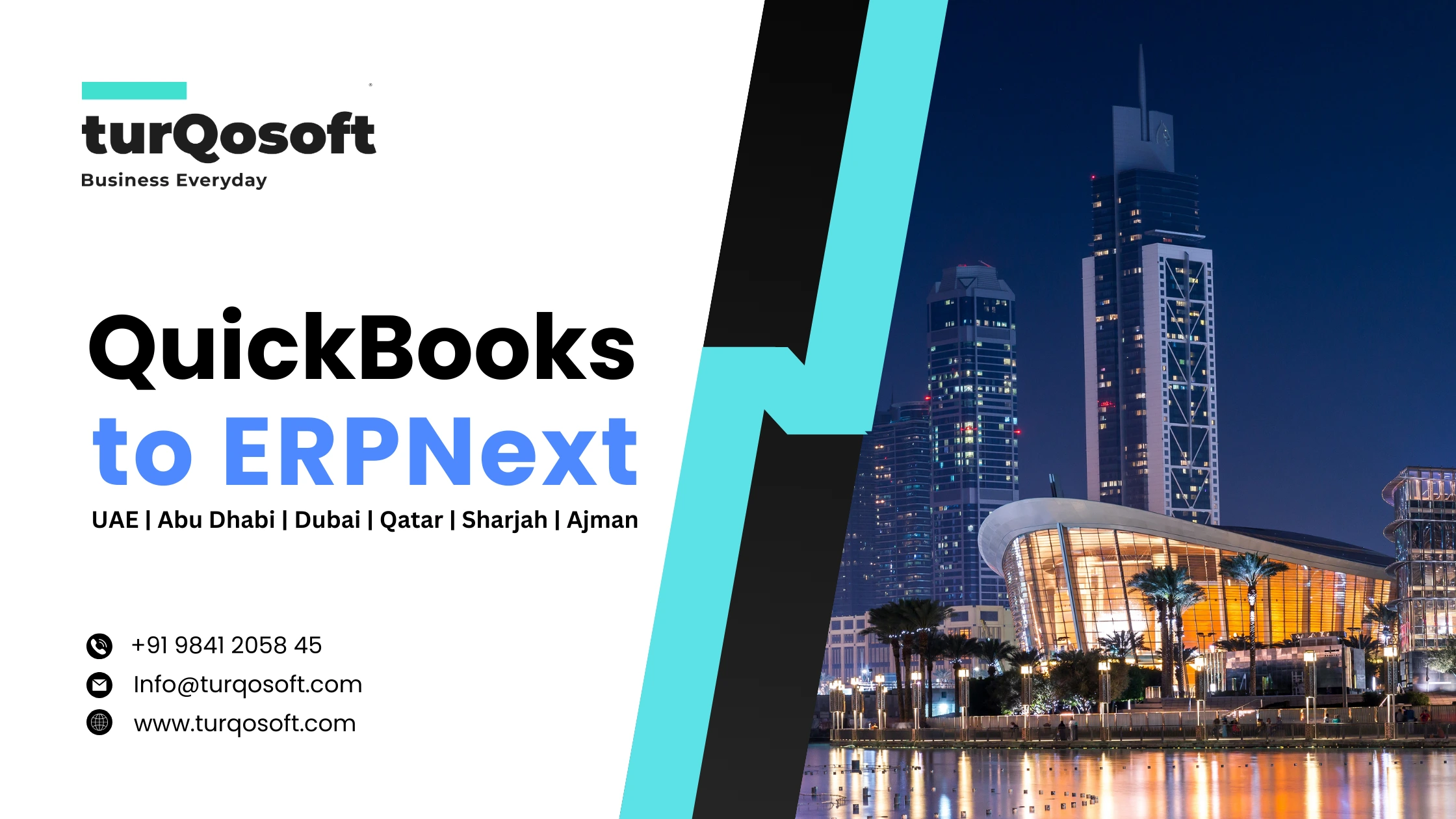QuickBooks to ERPNext UAE: The Best Alternative!

Managing business finances and operations in the UAE comes with unique challenges, and while QuickBooks has long been a go-to choice for accounting, it often falls short in addressing the broader needs of growing businesses. This is where QuickBooks to ERPNext UAE becomes a critical transition for companies seeking a game-changing alternative. Designed to offer more than just accounting, ERPNext provides UAE businesses with an all-in-one solution for managing resources, compliance, and scalability.
In this blog, we’ll examine why transitioning from QuickBooks to ERPNext UAE is a smart move and how ERPNext addresses the limitations of QuickBooks, giving UAE businesses a competitive edge.

Why Businesses in UAE Are Moving from QuickBooks to ERPNext?
QuickBooks has been a reliable tool for bookkeeping and basic financial management. However, UAE businesses face several limitations when relying solely on QuickBooks:
a) Limited Scalability
QuickBooks is best suited for small-scale operations. As UAE businesses grow, they require solutions that integrate inventory, sales, HR, and project management. QuickBooks doesn’t offer the depth or breadth to handle these needs.
b) Incomplete UAE VAT Compliance
While QuickBooks supports VAT, its lack of flexibility and customization often leads to compliance gaps, especially as UAE regulations evolve.
c) Fragmented Systems
To compensate for QuickBooks’ limitations, businesses often resort to third-party tools, leading to inefficiencies and siloed data.
d) Hidden Costs
Though QuickBooks appears cost-effective initially, the need for paid add-ons and integrations can escalate expenses significantly over time.
Why ERPNext Is the Perfect Alternative?
ERPNext UAE addresses the shortcomings of QuickBooks by offering a holistic, integrated platform tailored to the needs of UAE businesses. Here’s why it’s the ideal choice:
a) Comprehensive UAE VAT Compliance
ERPNext simplifies compliance with UAE VAT laws by offering:
- Automated VAT calculations and filings.
- Customized tax rules to align with UAE-specific requirements.
- Real-time VAT reports to streamline audits and submissions.
This ensures seamless compliance with the Federal Tax Authority (FTA), making the transition from QuickBooks to ERPNext a crucial upgrade for UAE businesses.
b) Localization Features
ERPNext is designed with regional needs in mind, offering:
- Support for multiple currencies and exchange rates.
- Arabic language options for easier accessibility.
- Tools for managing operations in UAE free zones, ensuring compliance with tax-exempt regulations.
c) Cost-Effective Scalability
Unlike QuickBooks, ERPNext offers a scalable, open-source model. Businesses can grow without incurring escalating costs, as ERPNext provides comprehensive functionality without the need for expensive add-ons.
d) Modular and Customizable
ERPNext’s modular structure allows businesses to customize the platform according to their specific needs. Whether it’s retail, construction, or manufacturing, ERPNext adapts to industry-specific requirements—something QuickBooks simply cannot do.
Features That Make ERPNext Stand Out
ERPNext isn’t just an accounting tool; it’s a full-fledged ERP solution that integrates all aspects of your business. Here’s how it compares to QuickBooks:
a) Integrated Financial Management
ERPNext consolidates accounting, inventory, sales, and payroll into a unified system. This eliminates the need for third-party integrations, ensuring efficiency and accuracy.
b) Advanced Inventory Management
With ERPNext, businesses can track inventory in real time, manage warehouses, and forecast stock levels. These features are particularly beneficial for UAE businesses involved in trade, distribution, or e-commerce.
c) Built-in Project Management
ERPNext includes tools for tracking budgets, timelines, and resource allocation—all integrated with accounting and HR. QuickBooks lacks this functionality entirely.
d) Robust HR and Payroll Management
Managing payroll in the UAE is complex due to diverse workforces and Wage Protection System (WPS) requirements. ERPNext simplifies this with:
- Automated payroll processing.
- Employee lifecycle management.
- Compliance with UAE labor laws and WPS standards.
Transitioning from QuickBooks to ERPNext UAE
Switching from QuickBooks to ERPNext may seem daunting, but with the right strategy, it can be a smooth and rewarding process. Here’s how to make the transition:
a) Assess Business Needs
Evaluate your current operations and identify the gaps that ERPNext can fill. ERPNext’s modular design lets you implement only the features you need initially and scale up later.
b) Plan Data Migration
Partner with an experienced implementation expert to migrate data from QuickBooks to ERPNext seamlessly. This ensures that customer records, invoices, and financial statements are transferred accurately.
c) Customize and Train
Leverage ERPNext’s customization options to adapt the system to your business processes. Provide training to your team to maximize adoption and minimize disruptions.
d) Optimize Post-Implementation
After going live, monitor system performance and make adjustments as necessary. ERPNext’s extensive documentation and active user community can help address challenges quickly.
Success Stories: UAE Businesses Leveraging ERPNext
Retailer in Dubai
A mid-sized retail business in Dubai struggled with fragmented systems for accounting and inventory. Transitioning from QuickBooks to ERPNext helped centralize operations, automate VAT filing, and improve inventory accuracy, saving hours of manual effort each week.
Free Zone Trading Company
A trading company in Jebel Ali Free Zone faced compliance challenges with QuickBooks. ERPNext provided seamless tools for managing VAT, free zone regulations, and currency exchanges, improving operational efficiency by 40%.
QuickBooks vs. ERPNext: A Comprehensive Comparison
Here’s a detailed comparison of QuickBooks and ERPNext to help you understand how they stack up against each other:
| Feature | QuickBooks | ERPNext |
|---|---|---|
| Core Focus | Primarily an accounting and bookkeeping tool. | A full-fledged ERP system that integrates accounting, inventory, HR, CRM, and more. |
| Scalability | Limited scalability for growing businesses. | Highly scalable; supports businesses of all sizes with modular functionalities. |
| VAT Compliance | Basic VAT support with limited customization for UAE-specific needs. | Comprehensive UAE VAT compliance with automated VAT filing and customized tax rules. |
| Inventory Management | Requires third-party tools for advanced inventory tracking. | Built-in inventory management with real-time tracking, stock forecasting, and warehouse control. |
| Project Management | No project management features. | Includes project tracking, budgeting, and resource management integrated with other modules. |
| HR and Payroll | Limited payroll functionality; requires additional software. | Built-in HR and payroll features, including WPS compliance for UAE labor laws. |
| Customization | Limited customization options. | Fully customizable; open-source platform allows businesses to tailor modules to specific needs. |
| Cost | Low initial cost but increases significantly with add-ons and integrations. | Cost-effective with affordable for hosted solutions. |
| Localization | Minimal support for regional requirements like free zone compliance. | Extensive localization- including multi-currency. |
| Third-Party Dependence | Heavy reliance on third-party apps to fill gaps in functionality. | Comprehensive out-of-the-box features reduce the need for external tools. |
| Open-Source | Proprietary software with no open-source flexibility. | Open-source, allowing for complete transparency and community-driven improvements. |
Why ERPNext Is the Right Choice?
The UAE’s competitive business environment demands tools that can adapt to unique challenges. ERPNext stands out as the superior choice for the following reasons:
- Complete UAE VAT compliance.
- Localization for regional and industry-specific requirements.
- Cost-effective scalability and customization.
- Seamless integration of all business functions.
Switching from QuickBooks to ERPNext UAE isn’t just an upgrade; it’s an investment in efficiency, growth, and compliance.
Conclusion
As UAE businesses continue to grow and face evolving challenges, the limitations of QuickBooks become increasingly apparent. ERPNext offers a robust, integrated alternative that not only addresses these gaps but also provides unparalleled flexibility and value.
If you’re ready to make the leap from QuickBooks to ERPNext UAE, now is the time. Embrace a solution designed for modern businesses and set your company up for lasting success.
Ready to transition?
Contact us today to explore how ERPNext can transform your business operations and streamline your growth journey!
Alternatively, you can reach out to our team at info@turqosoft.com or give a call at +91 9841205845.
Also, you can stay updated on more insights by following us on LinkedIn, YouTube, Facebook, Twitter, Pinterest, and Instagram.
Image Credit: Canva



Comment (1)
Jakob
Interesting